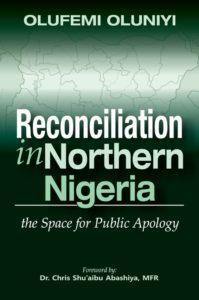Reconciliation in Northern Nigeria – The Space for Public Apology
REVIEWS, 6 Nov 2017
African Books Collective – TRANSCEND Media Service
Reconciliation in Northern Nigeria: The Space for Public Apology, by Olufemi Oluniyi, Frontier Press, Nigeria, 2017, 394 pp.
In this book, Dr. Olufemi Oluniyi takes a fresh look at Muslim-Christian violence which has become synonymous with the name of Northern Nigeria. It is fresh in the sense that he takes a historical approach to the problem, dating back to the founding of Northern Nigeria. This approach inevitably brings to the fore the culpability of the colonial government for the institutionalisation of inequality and for pursuing policies which are tantamount to planting the seeds of religious violence for post-independence fruitage and harvest. By highlighting the role of the colonial administration, he is by no means suggesting that post-independence perpetrators of violence are less culpable for their crimes against humanity. Rather, the highlight is meant to raise awareness of what was really going on, despite official cover-up.
“Dr. Oluniyi’s book on Northern Nigeria has many important lessons for Nigeria, West Africa and the rest of the world. Drawing on extensive analysis of the Northern Nigerian case the author insists that we look at the root causes of violence rather than just the presenting problems. The conclusion is clear. We will not be able to overcome current extremist violence in Africa or the Middle East unless there is willingness on the part of former colonial powers to acknowledge their complicity in its sources, make apology and work out ways of building mutuality across boundaries of difference. I commend it to anyone seeking to understand the origins of contemporary violence.”
— Professor Kevin P Clements, Chair and Director The National Centre for Peace and Conflict Studies University of Otago, New Zealand
**********
“Olufemi Oluniyi touches the deeper layers of the conflict in Northern Nigeria: the preferential treatment by the British colonial regime of Islam and the discriminatory treatment of indigenous Christians. To resolve the conflicts in the North, religious dialogue is not enough. He urges the building of bridges to the past. Both Great Britain and the Muslim community should apologize for sowing the seeds of the conflict. This recipe can be part of the solution when it also addresses the Christian support of the British Empire and when all the Nigerian religious leaders join, here and now, in the building of bridges to the future and help to construct a secure, affluent and bright country in which nobody is exposed anymore to the terrorism of poverty.”
— Prof Luc Reychler Emeritus Professor of International Relations Faculty of Social Sciences
***********
“The critical insights of this important book should be an inspiration for all good willing people in Nigeria to achieve a framework for a peaceful living together in mutual respect and justice in this century. In Central Europe we had, among others, a thirty years religious war (1618–1648) which was a power struggle between Catholic Habsburg (Vienna) and Protestant Sweden that resulted in thousands of deaths, misery, diseases and poverty of the people and in the occupation of foreign territory (e.g. of North-eastern Germany by Sweden until 1815) and in more richness and luxury of the winners. Religion was then used to legitimate power and violence. We need a new vision and mission to concentrate anywhere on the peace message of our religions and help them to get a positive impact for living together in peace. Dr. Olufemi Oluniyi and his balanced and well-researched book may contribute to such a needed change in perception and action that is needed anywhere.”
— Prof Hans Günter Brauch (rtd), Free University of Berlin Chair, Peace Research and European Security Studies (AFES-PRESS) Mosbach, Germany
_________________________________________
Rev. Olufemi Oluniyi, Ph.D. currently provides intellectual leadership and administrative direction at the Centre for Values and Social Change, Lagos, which he founded in 2008.
Go to Original – africanbookscollective.com
DISCLAIMER: The statements, views and opinions expressed in pieces republished here are solely those of the authors and do not necessarily represent those of TMS. In accordance with title 17 U.S.C. section 107, this material is distributed without profit to those who have expressed a prior interest in receiving the included information for research and educational purposes. TMS has no affiliation whatsoever with the originator of this article nor is TMS endorsed or sponsored by the originator. “GO TO ORIGINAL” links are provided as a convenience to our readers and allow for verification of authenticity. However, as originating pages are often updated by their originating host sites, the versions posted may not match the versions our readers view when clicking the “GO TO ORIGINAL” links. This site contains copyrighted material the use of which has not always been specifically authorized by the copyright owner. We are making such material available in our efforts to advance understanding of environmental, political, human rights, economic, democracy, scientific, and social justice issues, etc. We believe this constitutes a ‘fair use’ of any such copyrighted material as provided for in section 107 of the US Copyright Law. In accordance with Title 17 U.S.C. Section 107, the material on this site is distributed without profit to those who have expressed a prior interest in receiving the included information for research and educational purposes. For more information go to: http://www.law.cornell.edu/uscode/17/107.shtml. If you wish to use copyrighted material from this site for purposes of your own that go beyond ‘fair use’, you must obtain permission from the copyright owner.
